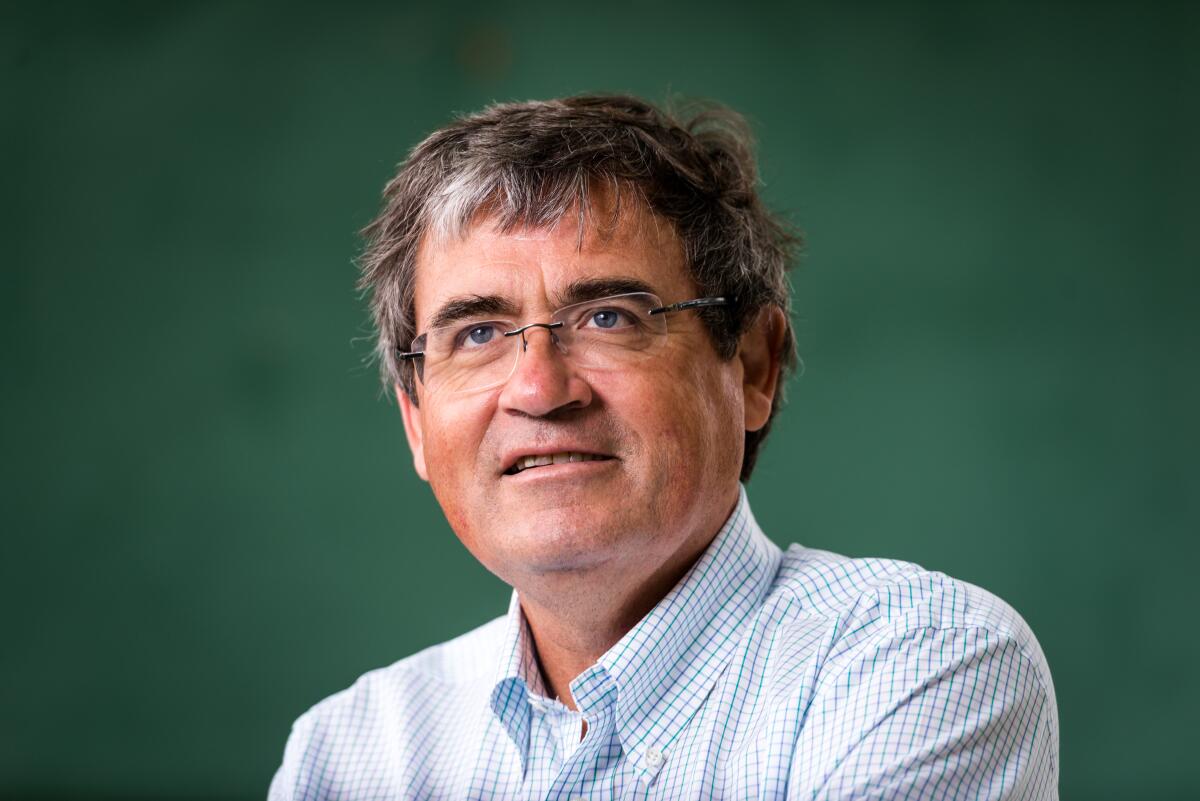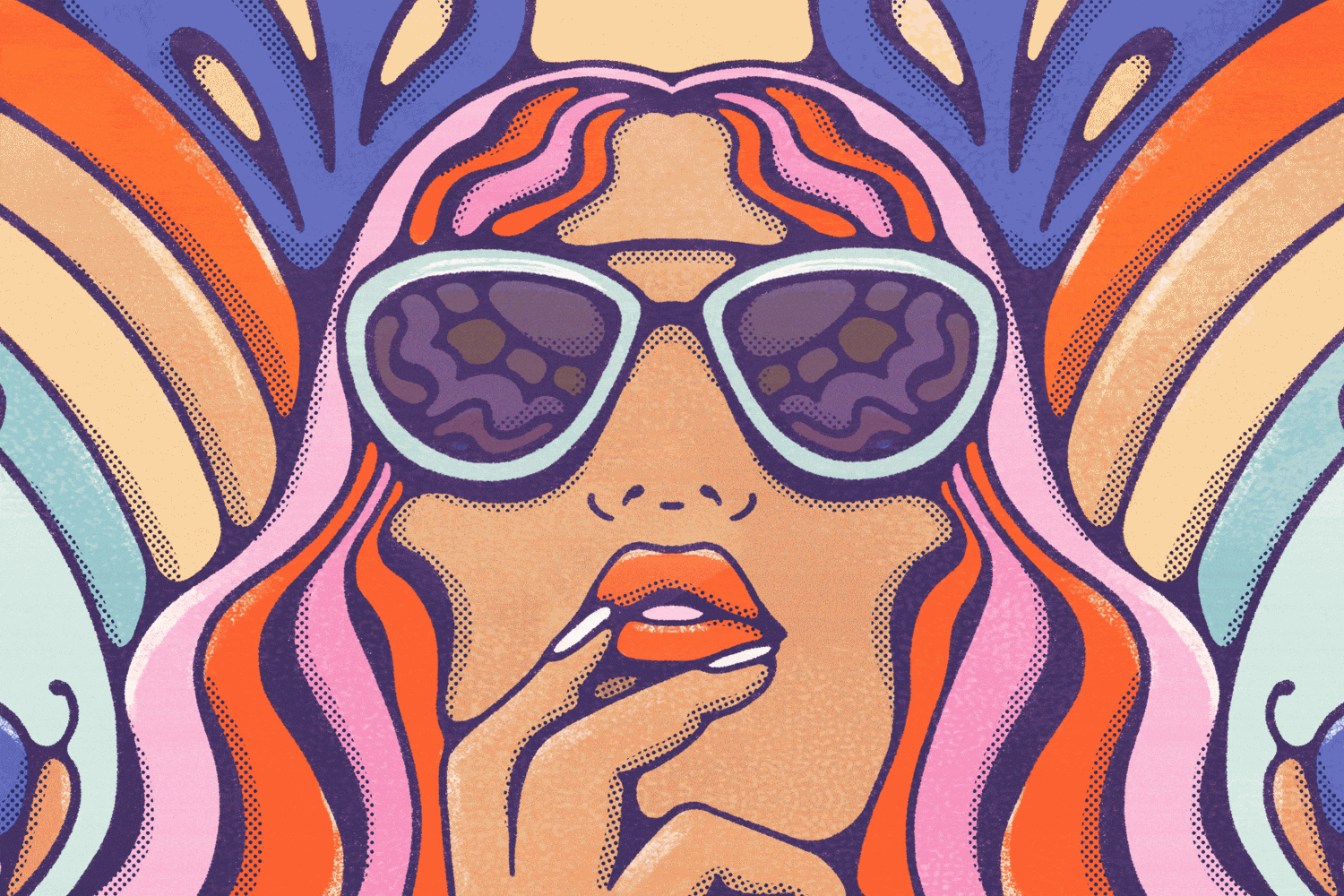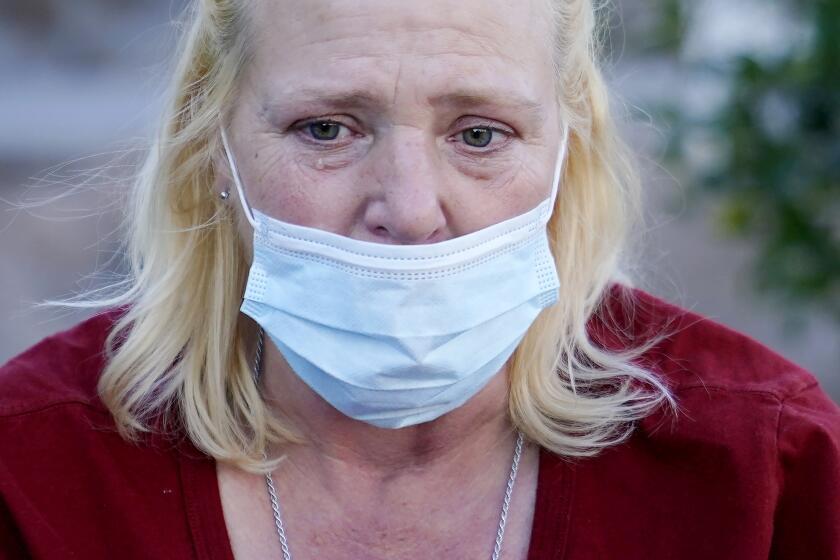Q&A: He’s studied mental illness for 50 years. Here are all the things we’re doing wrong

- Share via
The history of mental illness — and its treatment — is not for the faint of heart.
From ice-water plunges to the early days of electroshock therapy, from lobotomies (honored with a Nobel Prize in 1949) to Thorazine catatonia, its treatments belong to the pages of a dark dystopian novel. Often targeting the poor, the indigent, the most vulnerable, the attempted cures were cruel, unethical and often racist.
Yet the history demands to be understood.
The author of numerous books that delve into human psychoses and their treatments, Andrew Scull graduated from Oxford University in 1969 and arrived in America not long after the Community Mental Health Act of 1963 began to shutter hundreds of custodian institutions around the country.
Community health centers and treatment programs were meant to fill in that void by providing education and job training for the intellectually disabled. Yet today’s crises in homelessness and mental health make clear that these goals were either never achieved or simply abandoned.
Scull’s work was initially driven by one simple question: “Why did society imagine that institutionalizing people was so important, and why was so much capital — intellectual and financial — devoted to this end?”
It’s hard to know where this new year will take us, but here’s one thing we can control: Let’s resolve to thrive this year, and start enjoying life again — safely, of course.
The search for an answer made Scull, a professor of sociology and science studies at UC San Diego, a singular authority on more than 200 years of the medical profession’s tangled relationship with mental illness. In delineating this history — from asylums to psychopharmacology — he considers the challenge that individuals with mental illness pose for the health of a modern society.
Yet he knows how solutions are elusive and still far out of reach.
“What impresses me most,” he said, “is how recalcitrant mental illness is, how difficult it is to comprehend, how hard it is to come up with effective treatments and ultimately, how it is best to be honest about what we don’t know, so we can pursue a more eclectic approach to treating it and not be certain we know the right answer.”
In his latest book, “Desperate Remedies: Psychiatry’s Turbulent Quest to Cure Mental Illness,” out this month, Scull is especially critical of the last 20 years when research narrowed its focus onto possible biological factors for mental illness. The lack of concern with the social and psychological dimensions of mental disturbance, he argues, has precipitated inequities in treatment and led to the consignment of the mentally ill to the streets and jails of this country.
The interview with Scull has been edited for length and clarity.
Over the last 20 years, the plight of the mentally ill has become most conspicuous among those who are living on our streets. Is it time to declare that the community-based treatment model is a failure? What do you believe are the first steps we need to take in order to begin remedying the tragedy we see just outside our doorstep?
We need look no further than our jails and the gutters of our streets to view what the failures of contemporary mental health policy have wrought. The emptying out of asylums without any serious consideration of what was to replace them has contributed to problems of the homeless and the sidewalk psychotic that are now part of the fabric of our cities.
We ought to recoil from arrangements that condemn helpless and suffering human beings to homelessness and prison and stop pretending that chemistry is the sole and singular way forward. Those afflicted with serious forms of mental illness have been cast into the wilderness — a brutal and often fatal outcome for many with few resources of their own. These are people who lack the capacity to function in an environment where they are seen as a drain on the public purse. Chronically dependent on the not-so-tender mercies of a shrinking welfare state, they are doubly stigmatized: for their illness; and because they show few signs of reform or recovery.
If matters are to improve, we need to develop a multifaceted approach to understanding and dealing with the problems posed by serious mental illness. This requires a major commitment to housing, supporting and sheltering people who are incapable, for the most part, of providing for themselves. It means serious engagement with research about the best ways to provide these services. Families often find these burdens impossible to bear, and in other cases, patients flee their families. In either case, the alternatives are grim.
“Stop pretending that chemistry is the sole and singular way forward.” This is at the heart of your critique of Thomas Insel, who directed the National Institute of Mental Health from 2002 to 2015. Can you explain your argument? And what approach would you recommend its current director, Joshua Gordon, take?
Thomas Insel is busy promoting his new book, which carries the odd title of “Healing: Our Path from Mental Illness to Mental Health.” It is a curious endeavor, given that his 13 years in charge of the nation’s mental health research produced such uniformly dismal results. That’s not my opinion. It’s his.
When Insel stepped down as director of NIMH in 2015 he gave an interview about his accomplishments, after spending by his estimate $20 billion. “I spent 13 years at NIMH really pushing on the neuroscience and genetics of mental disorders, and when I look back on that … I don’t think we moved the needle in reducing suicide, reducing hospitalizations, improving recovery for the tens of millions of people who have mental illness.”
The number of older Americans who find themselves facing homelessness after a job loss, divorce, family death or health crisis is growing rapidly.
Actually, the situation is even worse than this implies. People with serious mental illness live, on average, 15 to 25 years less than the rest of us, and that gap seems to be widening, not narrowing. While genetics and neuroscience have flourished within the confines of universities, their therapeutic payoff has been minimal or nonexistent.
I’m a sociologist, so you may think I’m biased. Perhaps I am, but in my judgment, Insel’s fixation on biology and biology alone has been a profound error. It threatens to undermine the prospects for progress in the mental health arena.
Unfortunately, it is the same approach that seems to dominate the thinking and priorities of his successor at NIMH, Joshua Gordon. Gordon is a neuroscientist whose own work, focused on neural activity in mice, and his appointment indicates that the federal research enterprise will double down on neuroscience and genetics.
That’s a lot of time and money with little to show for it. Surely other voices are calling for a new approach.
Increasing numbers of psychiatrists, particularly those now entering the profession, are beginning to voice their discontent and dismay with the direction the profession has taken over the last four decades. That may prove a more potent source of pressure to change current priorities. But within academic psychiatry, as opposed to clinicians who work in the trenches, change is likely to prove harder to come by.
Careers in academic medicine are built on grant moneys and publications, and those have dried up for psychosocial research. It would take a brave psychiatrist to push against the status quo when the money and prestige that medical school administrators crave and rewards continue to flow toward scientists trying to find a biological link to the disease. Perhaps we shall at some point see the breakthroughs these folks have been promising us for years. Or perhaps these are once more soon-to-be dishonored promissory notes.
Your book, “Desperate Remedies,” focuses on the psychiatric profession, but we all bear responsibility. Despite the prevalence of mental illness, it still lies in the shadows, marginalized and stigmatized. What are we so afraid of? Why is it so difficult to acknowledge and so easy to ignore?
Mental illness haunts us, frightens us, and fascinates us. Its depredations are the source of immense suffering and not just for the mental patient. The havoc caused by depression, mania, and schizophrenia extends its tentacles to the family of the sufferer, and usually to the community at large.
Mental illness challenges our assumption that we share a commonsense universe. It injects uncertainty and often menace into our lives. It threatens on both a symbolic and a practical level the fabric of the social order. It is incomprehensible, and deeply disturbing, and we tend to respond by avoiding and stigmatizing those who suffer from it.
That stigma adds to the pain of those experiencing mental disturbances, often renders family members silent, and even extends its reach to those who claim to treat it. Psychiatrists are among the least respected medical professionals, and shrinks are a routine target of jokes about their competence and even their own mental stability.
These attitudes are deep-seated and hard to erase. The problems they create are exacerbated by how pernicious mental illness is. The needs of people with mental illness are great, but in the competition for public resources, they are poor advocates for themselves, and the plight of their families generates only token sympathy from many. In the competition for resources, they are heavily handicapped, and in hard times, mental health budgets are routinely targeted for cuts.
Research, searching for the cause of mental illness, is often divided by the nature-versus-nurture debate: Either we are born with a predisposition for the disease, or it is acquired in the course of private trauma. You recommend that we abandon these lines of inquiry. Why?
I’m convinced that madness cannot be divorced from the cultural, social, and psychological matrix within which human beings exist. To deny that social and psychological factors play a major role in the genesis and course of mental illness is to blind ourselves to a mountain of evidence, epidemiological and otherwise, that teaches us that the environment powerfully matters.
Treating the biological and the social as separate entities is profoundly misguided. To an extent unparalleled in any other part of the animal kingdom, humans’ brains continue to develop post-natally in ways heavily conditioned by the environment. Culture and society, on both a grand and a microscopic scale, interact powerfully with our lifestyle choices and our biology, and the physical structure and functioning of our brains are shaped by psychosocial and other sensory inputs. Human neuroplasticity extends far beyond childhood.
To think of the brain as an asocial or pre-social organ is thus deeply mistaken. So too is the crude parallel notion that mental illness — the breakdown of our cognitive and emotional life — is just brain disease. That said, I would be astonished if it turns out that biology has no role to play in the origins of many major forms of mental illness. To dismiss any role for biological factors is to don a different set of blinkers. One self-imposed blindness is as bad as the other.
The treatment of mental illness has often been worse than the disease. Is this the case of best intentions going tragically awry? Why do you suppose psychiatry’s attempts to cure mental illness have been so lacking in humanity?
Mental illness has forced psychiatry to wrestle with profoundly difficult matters. As my history shows, the intractable nature of the disease and the desperation of the afflicted has often proved a toxic combination, an invitation to therapeutic experimentation and excess.
It is true many treatments added to the suffering of the mentally ill. Compulsory sterilization; removal of teeth, tonsils and internal organs to eliminate the infections that were allegedly poisoning their brains; inducing life-threatening comas with injections of insulin; subjecting them to multiple episodes of electroshock treatments day after day till they were dazed, incontinent, and unable to walk or feed themselves; damaging the frontal lobes of the brain, either with an instrument resembling a butter-knife or by using a hammer to insert an icepick through the eye socket and sever brain tissue: these were unambiguously, horrendous interventions.
The antipsychotics and antidepressants that have come to dominate psychiatric practice since the mid-1950s are a more complex matter. These drugs are no psychiatric penicillin. For some sufferers, they provide a measure of symptomatic relief — and we need to acknowledge that — but at the same time we should be clear-eyed and not exaggerate their value.
How to help L.A.’s sickest homeless people has aggravated a growing rift between the city and county, which for several years had worked together to address homelessness.
While we do not have cures for diabetes or AIDS, we have managed to turn those afflictions into manageable diseases, but our pharmaceutical treatments for mental illness are nowhere near this effective. Meanwhile, the big drug companies, having made a fortune from antipsychotic drugs, and ruthlessly marketing them while concealing their drawbacks, have abandoned any attempt to develop new and improved chemical remedies. Prospects on this front, I regret to say, seem dismal at present.
After nearly 50 years studying mental illness and following these trends, what hope can you offer us?
Hope, in my opinion, is not yet in sight. Before we get there, we need to take a few steps.
First, I think psychiatry has to be more honest about its limitations and not treat biology as the primary cause and recognize the social dimension of mental illness. It needs to stop chasing magic bullets.
Second, states and the federal government must recommit to providing the services that mental hospitals once offered: shelter, food, clothing and some semblance of social support.We need our political system to act appropriately rather than have politicians wash their hands of the situation.
Third, we have to rethink mental illness and accord a high priority not just to those with mental illness, but those who are incapable of providing for themselves. The depth of pain and suffering they experience is almost unimaginable, and we should be making serious efforts alleviating problems for them and the families.
Finally, we need to be cautious and properly skeptical when we hear of the latest claims of major breakthroughs in this field. There have been far too many false dawns. Madness refuses to bend itself to the rule of reason. It is nonetheless a riddle we must continue to strive to solve. The misery and suffering mental illness brings in its wake demand nothing less of us.
More to Read
Sign up for Essential California
The most important California stories and recommendations in your inbox every morning.
You may occasionally receive promotional content from the Los Angeles Times.














